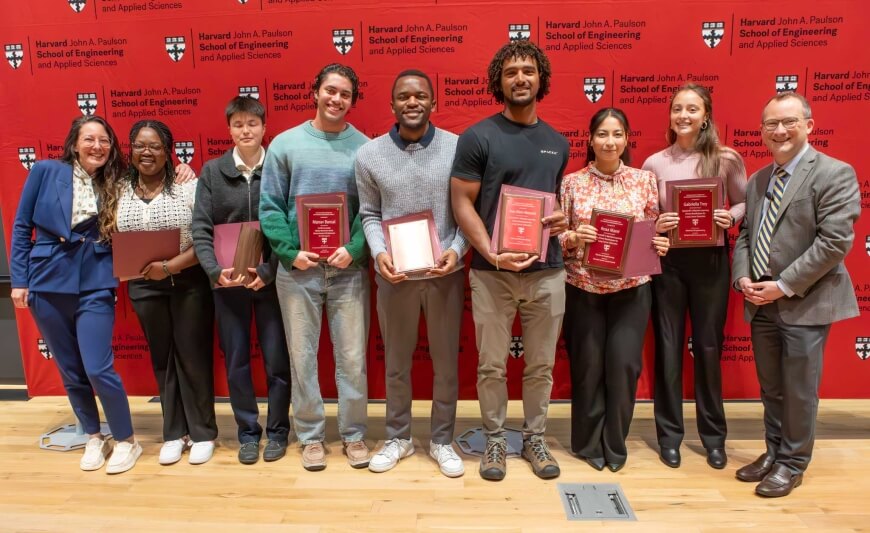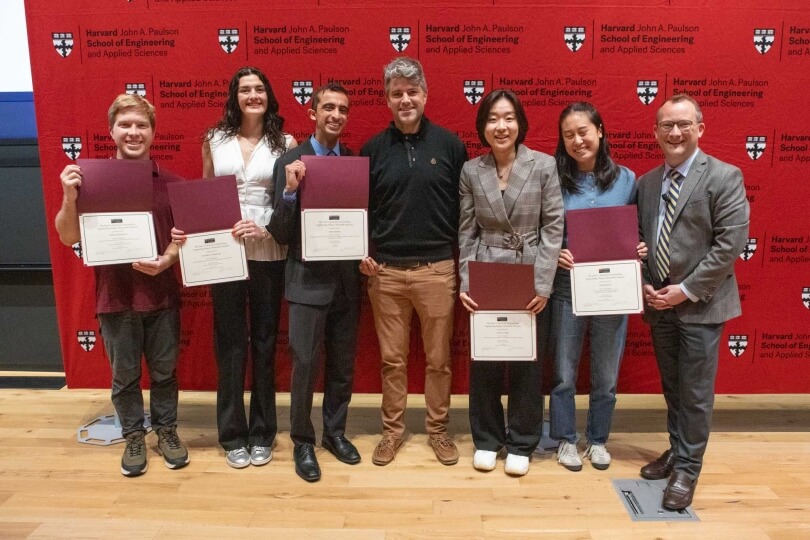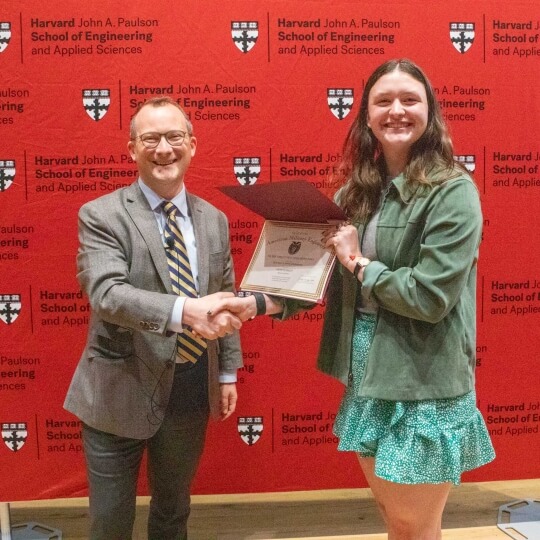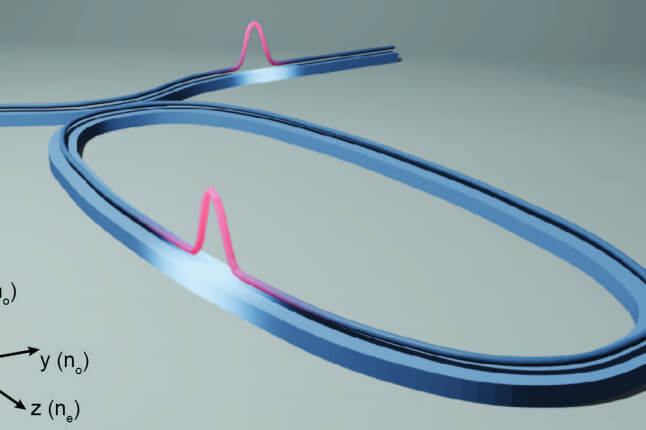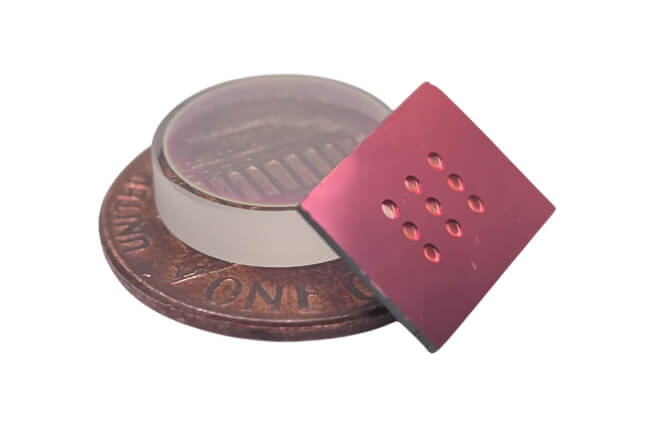News
SEAS Dean David Parkes with the seven winners of the 2025 Dean’s Award for Outstanding Engineering Projects (Eliza Grinnell/SEAS)
Seven students from the Harvard John A. Paulson School of Engineering and Applied Sciences (SEAS) were recognized with the Dean’s Award for Outstanding Engineering Projects. Recipients participated in ES100, a year-long capstone course for seniors in the SB engineering program, where each student develops a project to address a real-world engineering problem. The ceremony followed the students’ induction into the Order of the Engineer.
“Today you join the prestigious Order of the Engineer,” said SEAS Dean David Parkes. “In your oath, you pledged that when needed, your skill and knowledge shall be given without reservation for the public good. Let me tell you – it is needed now. We need engineers to tackle hard problems and find solutions to societal challenges that can positively impact our world, our nations, and our communities.”
For the 2024-25 academic year, 65 students completed ES100 projects. Five projects, including one three-student team project, were selected for the award. Topics covered by the award-winning projects included a breathalyzer for early detection of lung cancer, a tethered hybrid drone for aerial and underwater travel, a hydrogel patch that mechanically accelerates wound closure and targets release of antibiotics to prevent infection or cancer recurrence, and a scalable electrochemical cell for CO2 capture and industrial decarbonation.
Langelihle Siziba’s project, “Optimization of Graphene Electrodes for Electric Field-Stimulated Crystallography,” developed graphene-based electrodes for more accurate and sustainable observation of protein crystals. Traditional metallic electrodes run the risk of electric arcing at high voltages, which can damage both the protein samples and the electrodes themselves.
SEAS Dean David Parkes with the five Honorable Mention recipients (Eliza Grinnell/SEAS)
“The electric field acts as a stimulus, and you can use x-ray crystallography to record the changes to the protein’s structure,” Siziba said. “This helps us understand how proteins change. In fields such as nanorobotics, which can use proteins, that would be very beneficial, as well as helping us understand enzymes and drug delivery.”
The other four award winners were:
- Alex Klein Wassink, Roaa Marei and Gabriella Troy, electrical engineering, for their project,”SpiroSniff: A Machine Learning Driven Breathalyzer for Lung Cancer”
- KaiLan Su Mackey, bioengineering, for her project, “Modular hydrogel patch for localized cancer treatment”
- Micheal Awah, mechanical engineering, for his project, “Design and Control of a Hybrid Aerial and Underwater Vehicle with a Dynamic Tether”
- Manav Bansal, environmental science and engineering, for his project, “Ferri/Ferrocyanide Bipolar-Membrane-Based Electrochemical Cell Optimized for CO2 Capture”
“It was really awesome to work on a group project,” Klein Wassink said. “We delineated roles. I was focused on the electrical engineering elements, and I had very little experience with that. Figuring that out as I went was really fun and engaging, and putting all of our pieces together into a cohesive project was great.”
Six additional SEAS students received Honorable Mentions for their capstone projects. They are:
-
SEAS Dean David Parkes presents Faith Schmidt with her award New York post of the Society of American Military Engineers (Eliza Grinnell/SEAS)
- Honor C.S. Pimental, bioengineering, for her project, “Building Stronger Nanofiber Scaffolds for Regenerative Aortic Valves”
- Arjun Batra, electrical engineering, for his project, “Designing Battery-Power Electronics System for High-Voltage Size, Weight, and Power-Constrained Applications”
- Mot Harris Dunlop Stothart, environmental science and engineering, for his project “Martian Environmental Testing Chamber”
- Soyoun Choi, mechanical engineering, for her project, “Capacitive Strain Sensor System for Soft-Rigid Hybrid Robotic Grippers”
- Addison Liu, mechanical engineering, for her project “An Intraoperative Device for Assessment of the Mitral Valve Coaptation Zone”
Faith Schmidt was awarded a $500 award from the New York post of the Society of American Military Engineers. Schmidt, Josh Halberstadt and Ray Noh worked together to develop a group serving pouch, offering a lighter, more sustainable and safer way to distribute rations to groups of soldiers. Coming from a multi-generation military family, Schmidt will train as a U.S. Air Force pilot at Vance Air Force Base in Enid, Oklahoma.
“The goal was to develop a pouch to replace the cans that liquid vegetables and fruits are carried in with military rations,” Schmidt said. “Knowing that the end-user will be operational military members, and the way we designed our pouch would affect their daily lives and how they carried out their jobs, made me think about my family line, and how they executed their jobs.”
Topics: Academics, Awards, Bioengineering, Electrical Engineering, Environmental Science & Engineering, Materials Science & Mechanical Engineering
Cutting-edge science delivered direct to your inbox.
Join the Harvard SEAS mailing list.
Press Contact
Matt Goisman | mgoisman@g.harvard.edu
